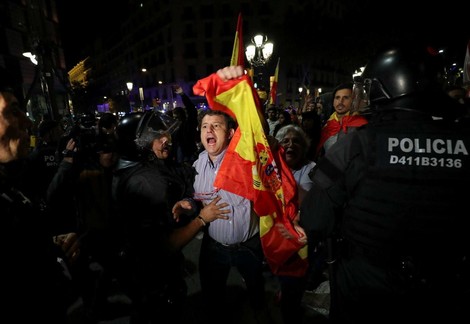Your podcast discovery platform
Curious minds select the most fascinating podcasts from around the world. Discover hand-piqd audio recommendations on your favorite topics.

piqer for: Globalization and politics Global finds
Sezin Öney, originally from Turkey, is based in Budapest and Istanbul. She her journalism career as a foreign news reporter in 1999 and she turned into political analysis as a columnist since 2007. Her interest in her main academic subject area of populism was sparked almost decade ago; and now she focuses specifically on populist leadership, and populism in Turkey and Hungary. She studied international relations, nationalism, international law, Jewish history, comparative politics and discourse analysis across Europe.
Catalonia’s Three Ways Forward
Who would have thought that Catalonia would suddenly become the source of such controversy in Europe? Spain was regarded as a successful case of transition to democracy; Catalonia, a haven of tourism, arts, culture, entertainment and business. But, the independence referendum on October 1 and the central government's harsh reaction changed all that. There is even the prospect that some Catalans may take refuge in other European countries such as Belgium. So, what's next for Catalonia?
Sergi Pardos-Prado, an Oxford-based academic specializing in politics, analyzes the prospects faced by Catalonia. He proposes three possible scenarios for the region and Spain in general. The first scenario, according to Pardos-Prado, is the centralization of power by Spain. It was unforeseen that Madrid possesses such centralizing powers backed by the Constitution: but it does. As Pardos-Prado puts it:
"When Spain’s incumbent Partido Popular announced it would take back control of the regional government, police, bureaucracy and public broadcasters, we learned that recentralization is a serious option for the first time in decades."
While "recentralization" is the most likely scenario, it is also the most dangerous one: Pardos-Prado emphasizes that support for independence is "high across the socioeconomic continuum, which makes it more difficult to contain or co-opt"and therefore, any more pressure from Madrid may indeed backfire.
The second (most unlikely) scenario is exactly the opposite of the first: further decentralization. But, according to Pardos-Prado, that will not be forthcoming. The third option that the academic foresees is implementation of a new and legal referendum – meaning a "negotiated repetition" of the independence vote. In this case, both parties would be willing to make some concessions and they would be negotiating in the process. Pardos-Prado cautions that neither of the scenarios is devoid of cons, but in any case, bloodshed must be prevented at all costs.

"allowing bloodshed in one of the wealthiest regions in 21st-century europe would mean a dramatic political failure." how true! thanks for this piq, sezin!